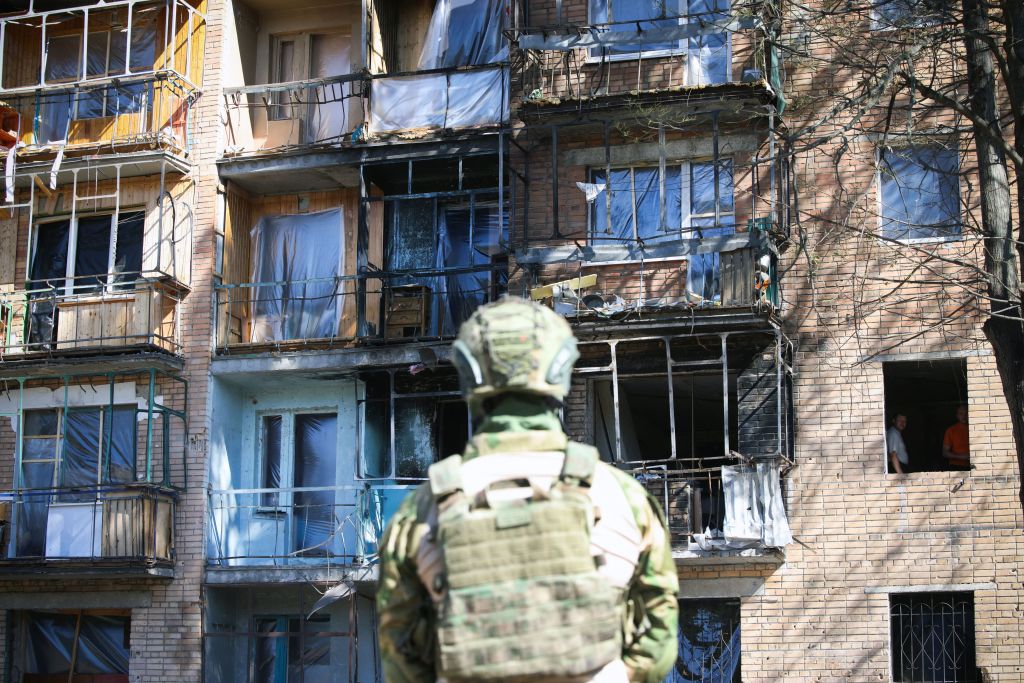Over the past week, Ukrainian forces have established a 1,000-square-kilometre bulge in Russia’s Kursk region. An additional thrust to the south, in the Belgorod region, is also underway. Ukraine‘s foreign ministry says it aims to create a buffer zone to prevent missile attacks, but other objectives seem paramount: to draw Russian forces from the front lines, seize a bargaining chip for future negotiations, embarrass the Kremlin, and boost Ukrainian morale while heartening its Western backers.
The Kursk attacks are more akin to border raids than a genuine offensive campaign. As with Ukrainian missile attacks on Russian naval forces in the Black Sea or targets inside Russia, the raid serves to harass Russian forces and distract them from their main objective. But it cannot substitute for the combat power needed to exploit a breakthrough in Russia’s front lines — combat power that Kyiv does not possess and seems unable to generate.
So far, Russia does not seem to have drawn significant forces from the front lines, though the army has reportedly moved some. Russian commanders may prefer to keep up pressure there and let reserve forces labour to reverse the incursion, expecting that logistical burdens will make it harder to maintain. What’s more, with Russia concentrating airpower on stopping Ukraine’s forces, and the heavier losses troops on offensive tend to suffer versus defenders, Ukraine may be sacrificing manpower it increasingly needs for defence. But it’s also worth noting that as Ukraine grabs territory in Russia, Russia is making steady and more consequential progress inside Ukraine.
Gaining leverage to negotiate over territory is also a worthwhile objective, but no leverage is gained unless Ukrainian forces hold the territory they have seized or can attrit a lot more Russian forces than they themselves lose. At the moment, neither seems likely.
Likewise, any boost to Ukraine’s morale and its Western support from the Kursk offensive will be lost if the territory is. And while Russian leaders may be embarrassed, it is far too early to assume that this will undermine support for Vladimir Putin or the war. Indeed, it may ultimately anger and motivate Russians more than it demoralises them, as often happens with direct attacks on enemies’ territory.
So far, any negotiating leverage Ukraine may gain by seizing Russian land seems less relevant than its negative effect in hardening the enemy’s position. The Kremlin reportedly cancelled negotiations with Ukraine around limiting attacks on energy facilities because of the Kursk incursion, though Russian leaders deny it. Had those talks occurred, they might have provided the eventual basis for a full ceasefire.
Another potential cost of the incursion is Russian escalation, which could mean nuclear attacks, or attacks against US interests. While such concerns should not be ignored, the risk of escalation seems limited so far, mainly due to the relative military insignificance of the territory gained. Other Ukrainian actions, especially recent attacks on Russian early warning radar systems, raise more acute concerns than a conventional border incursion far from Russia’s strategic core.
The Kursk incursion also underlines Russia’s weakness. The fact that the country’s forces have not been able to reestablish control over their own territory for weeks should drive home the point that Russia is hardly, as many commentators claim, poised to invade the European industrial heartland and establish hegemony on the continent. In this war, Russia has suffered serial embarrassment at the hands of a foe far weaker than Nato — the failure of the initial Russian assault on Kyiv, the sinking of the Moskva, and Yevgeny Prigozhin’s bizarre aborted mutiny, to name just a few.
So from this raid we see once again that Ukraine is desperate and Russia is surprisingly weak. This is the toxic combination that helped bring about the war in the first place and that may raise the odds of escalation as the conflict continues. That Ukraine seeks to gain some bargaining leverage via its bold raid is perhaps a heartening sign that Kyiv is eschewing its maximal goals of retaking all its lost territory and is instead preparing for negotiations. In our view, this would best be pursued not by gambles like Kursk, but instead by consolidating its frontline defences.
If Russia refuses to negotiate and continues to throw its forces at the front, they will be swimming upstream against a defence-dominant environment that Ukraine can harness to its own benefit. The United States should be encouraging Kyiv to take this course, rather than symbolic coups de main.











Join the discussion
Join like minded readers that support our journalism by becoming a paid subscriber
To join the discussion in the comments, become a paid subscriber.
Join like minded readers that support our journalism, read unlimited articles and enjoy other subscriber-only benefits.
Subscribe